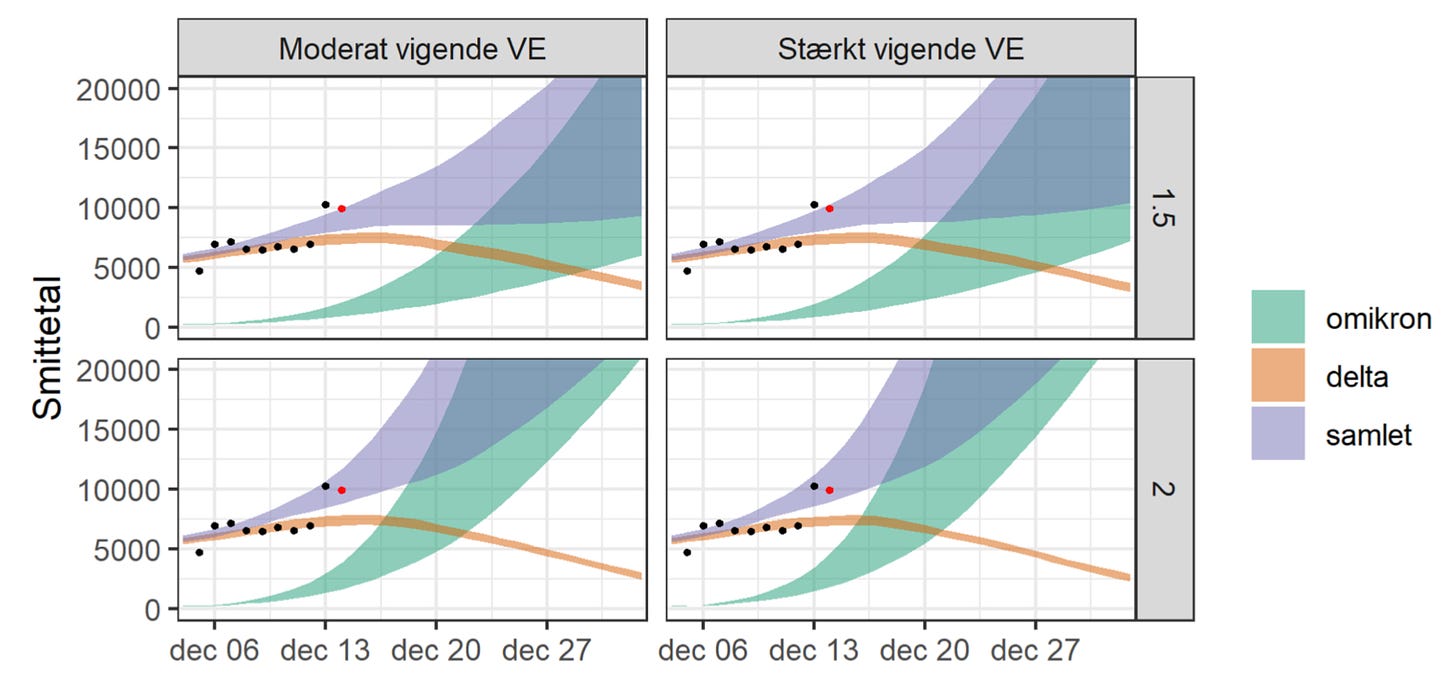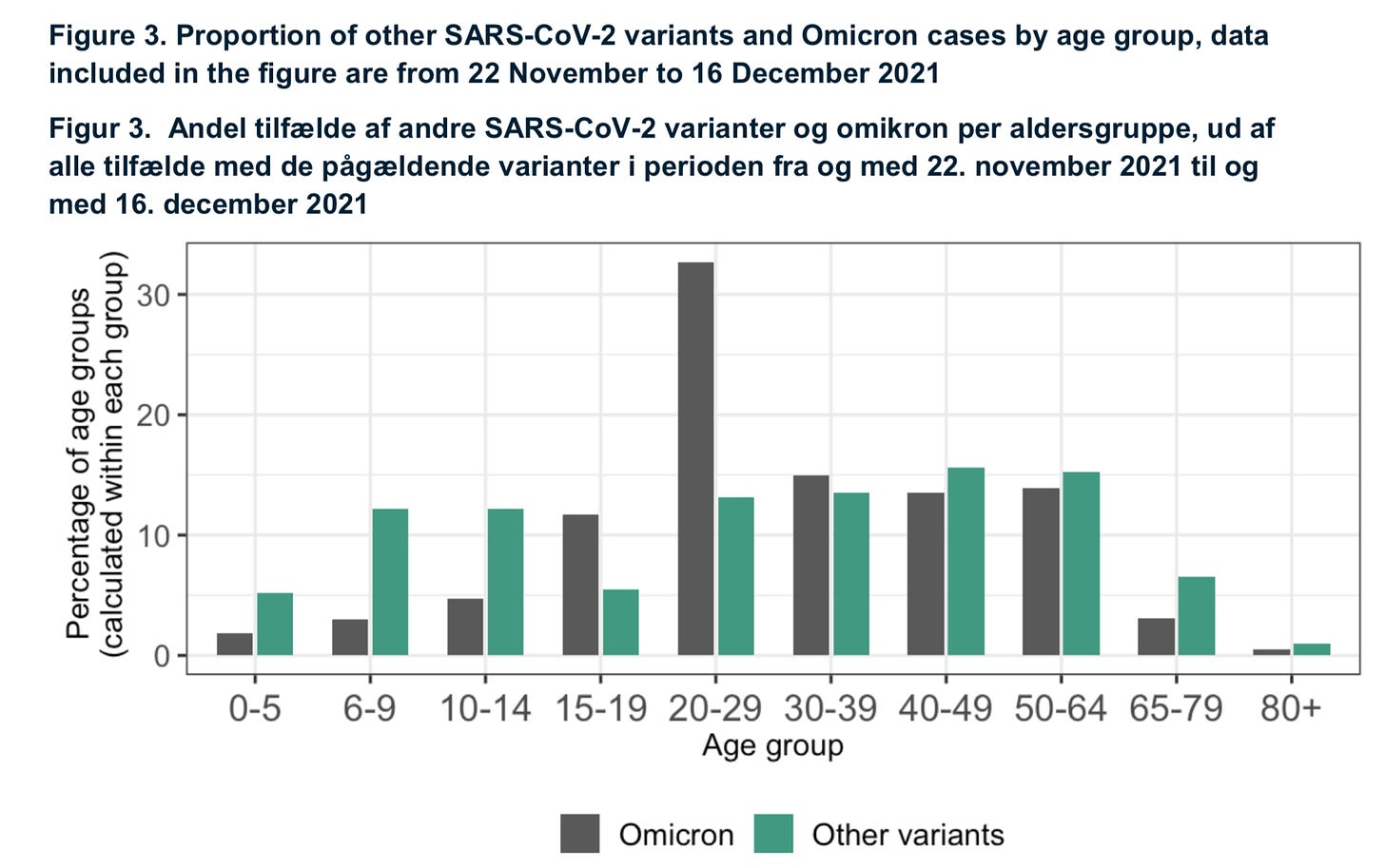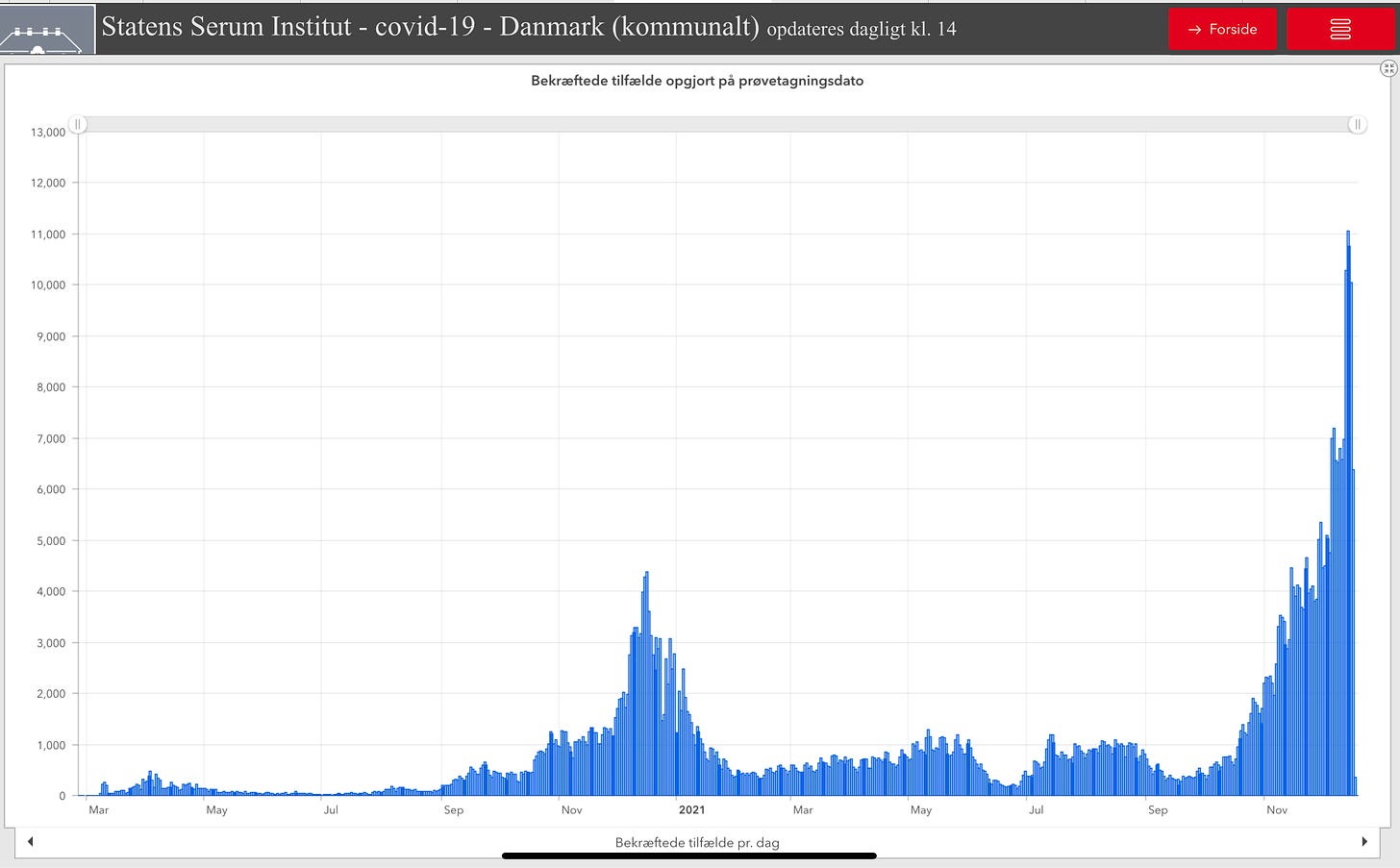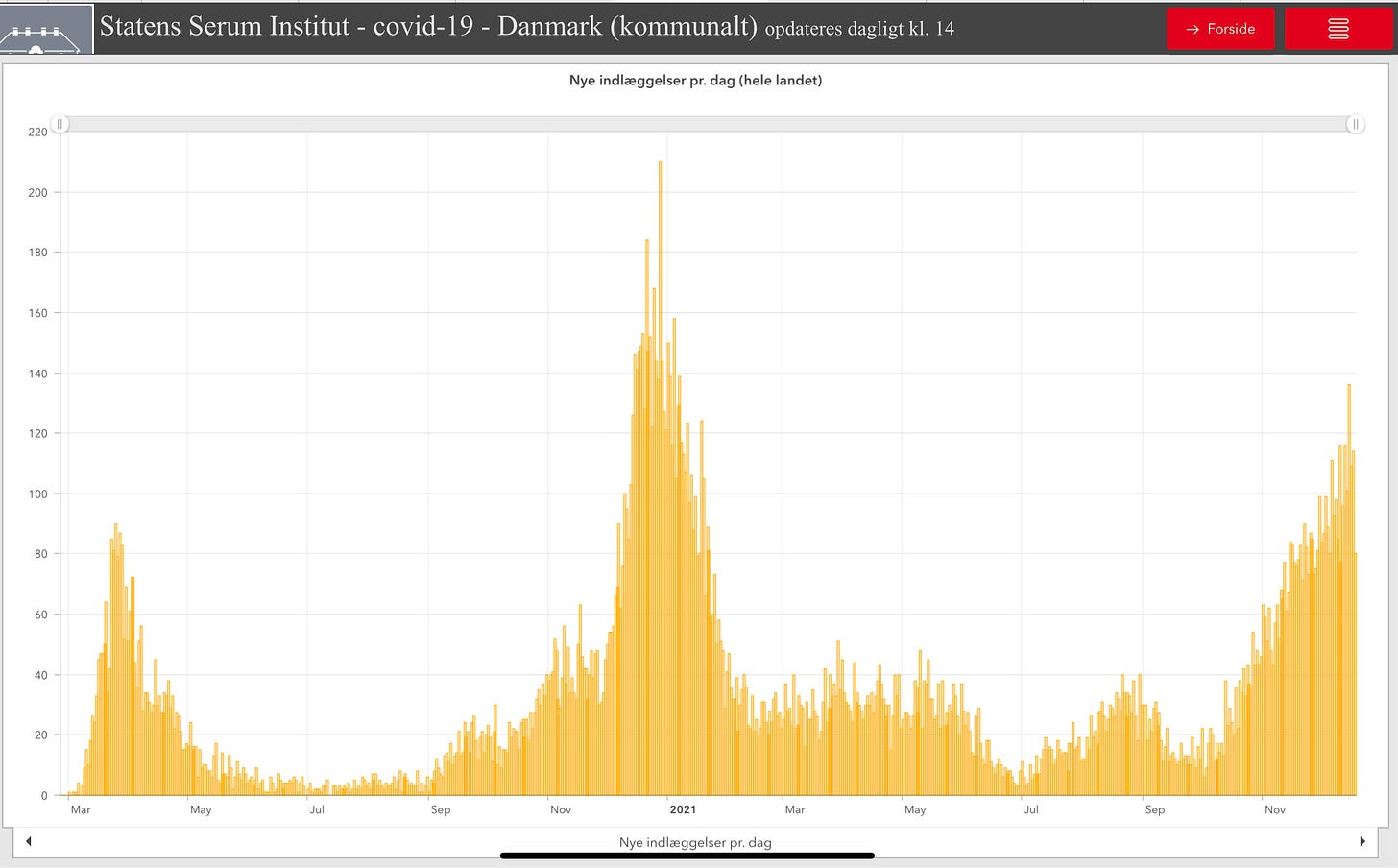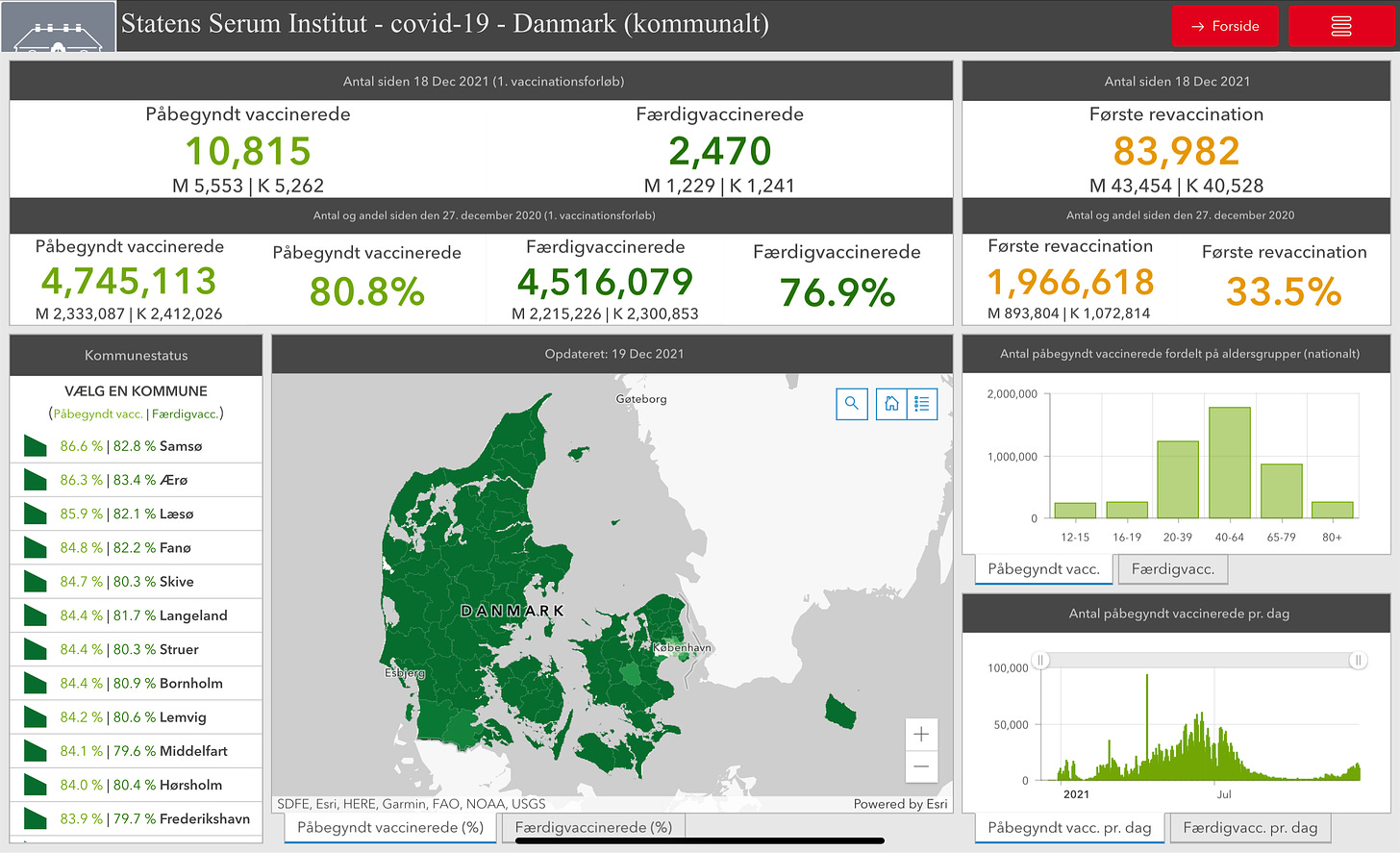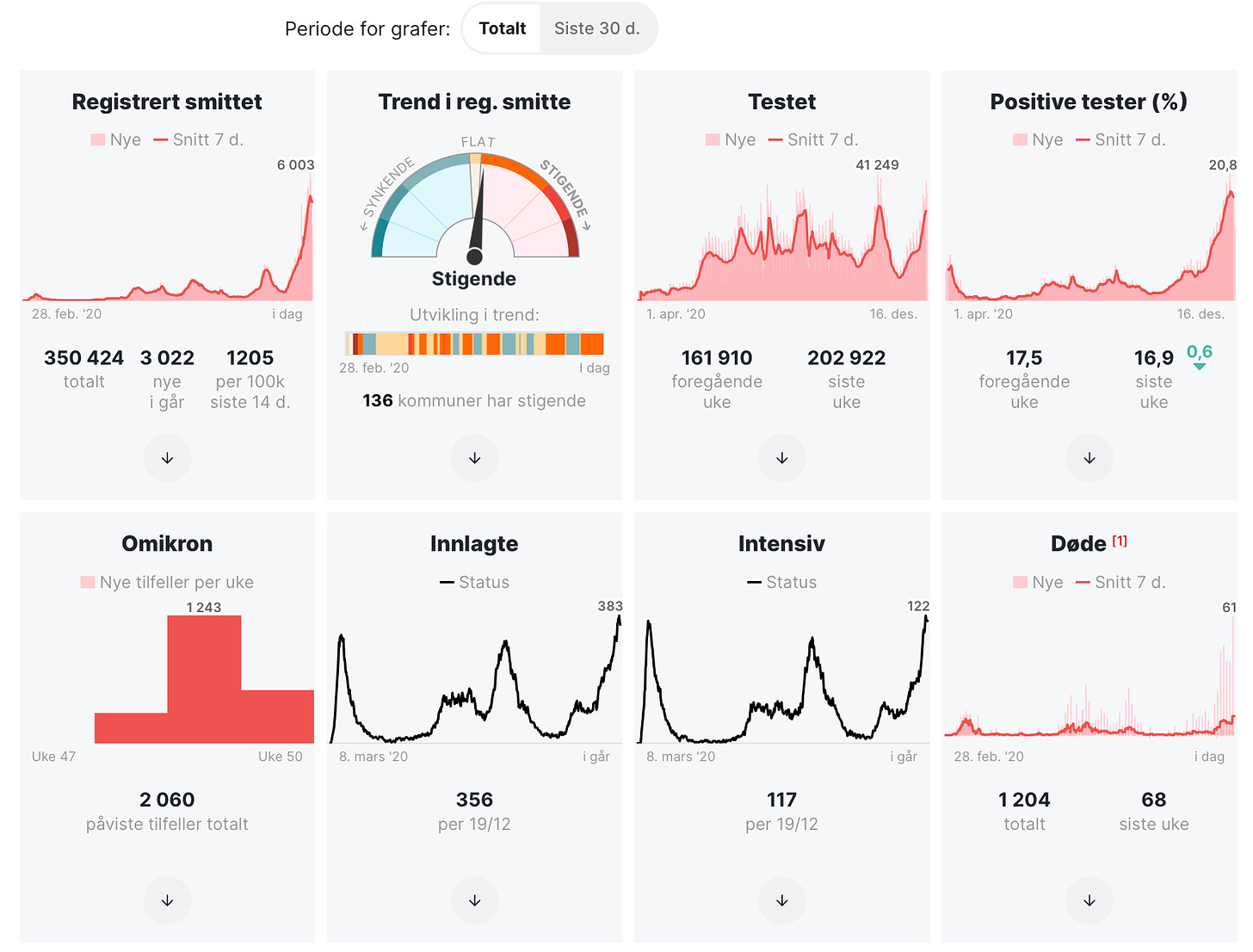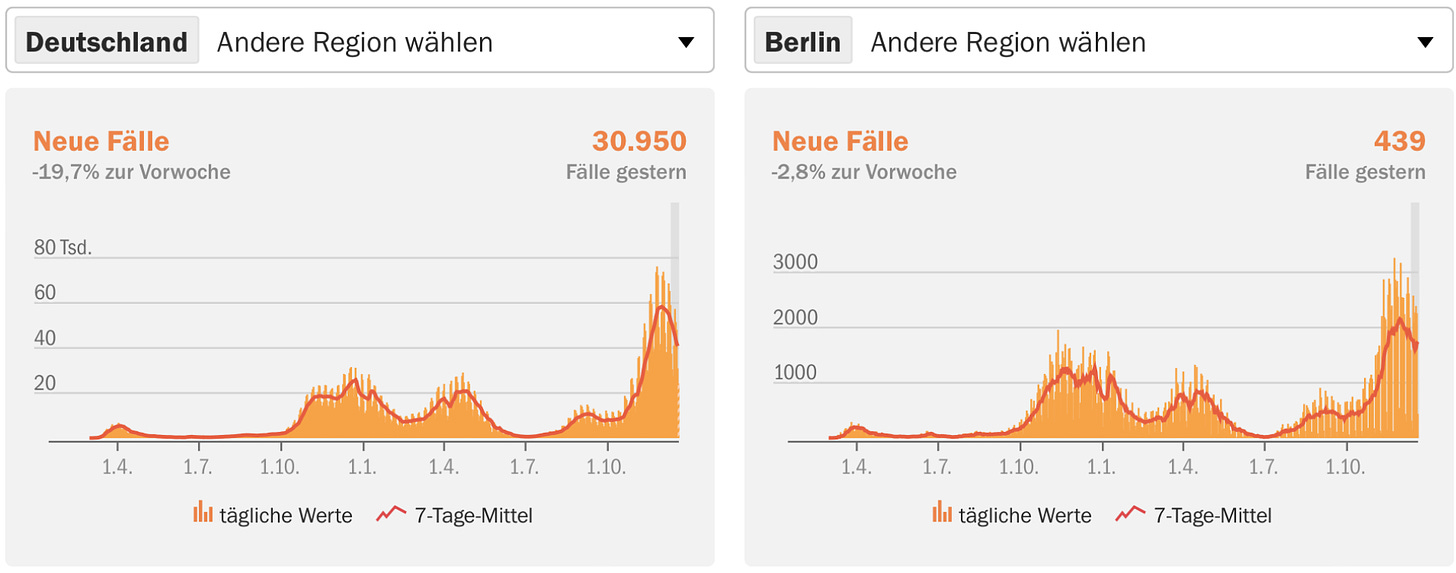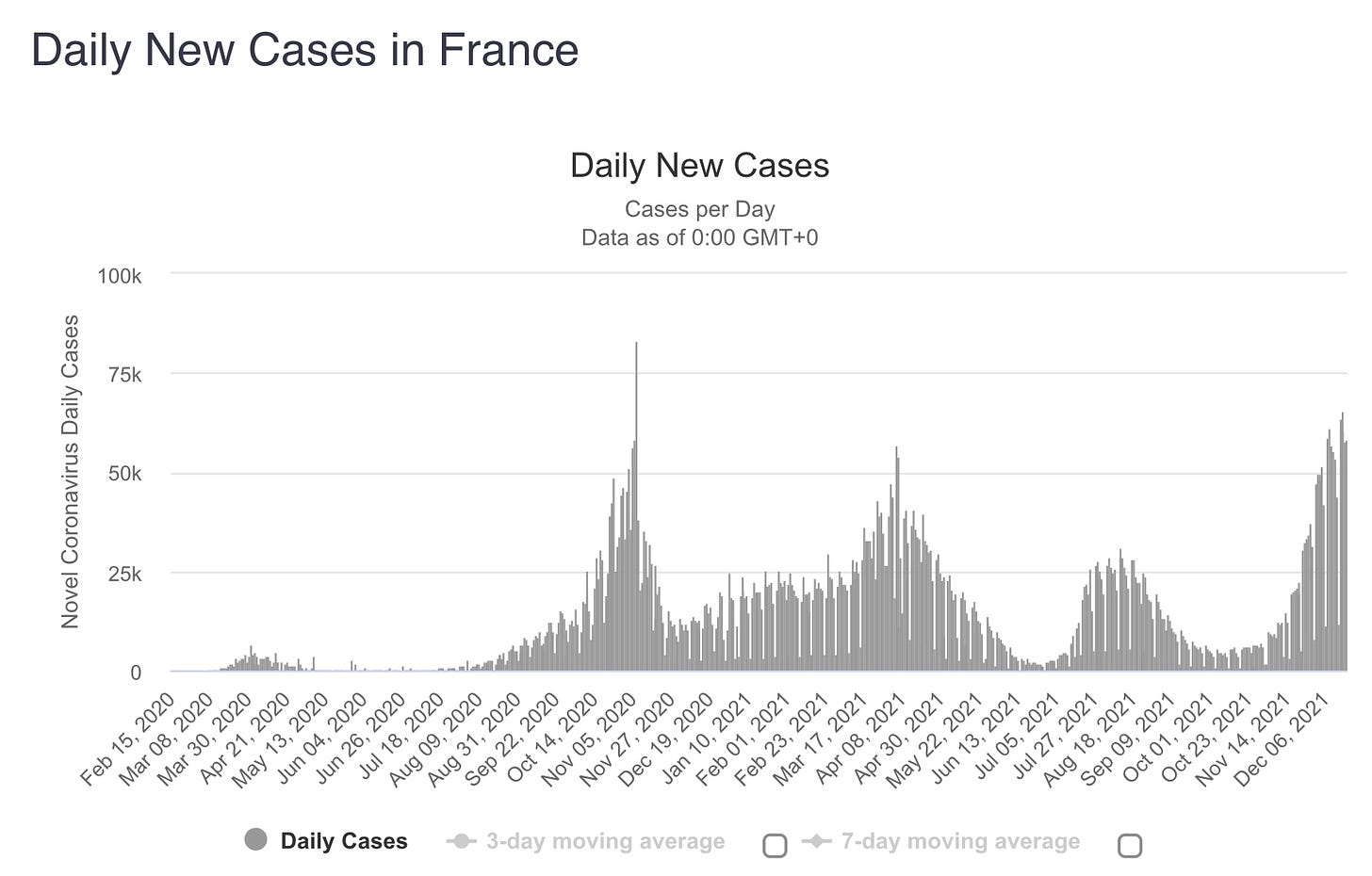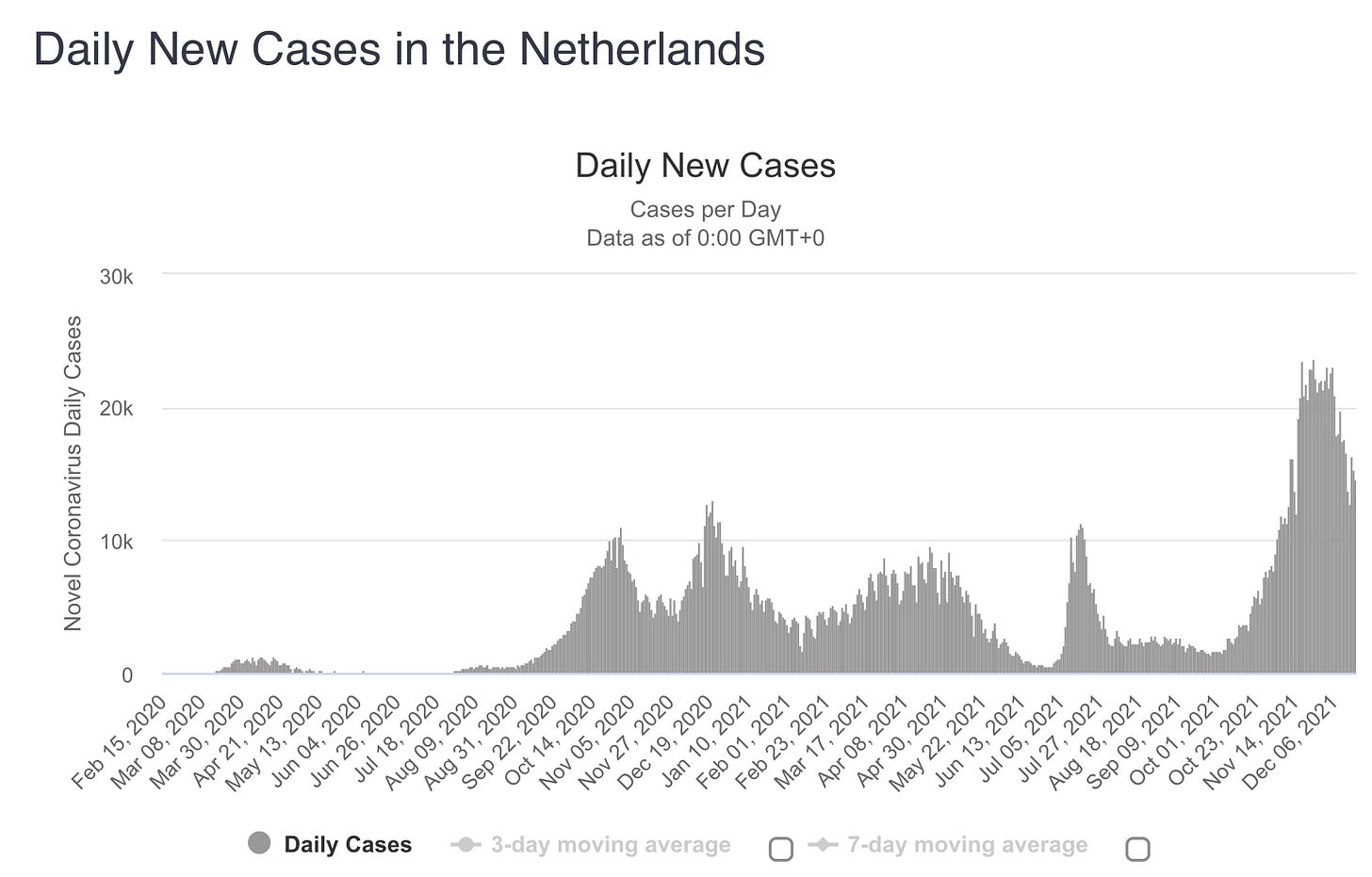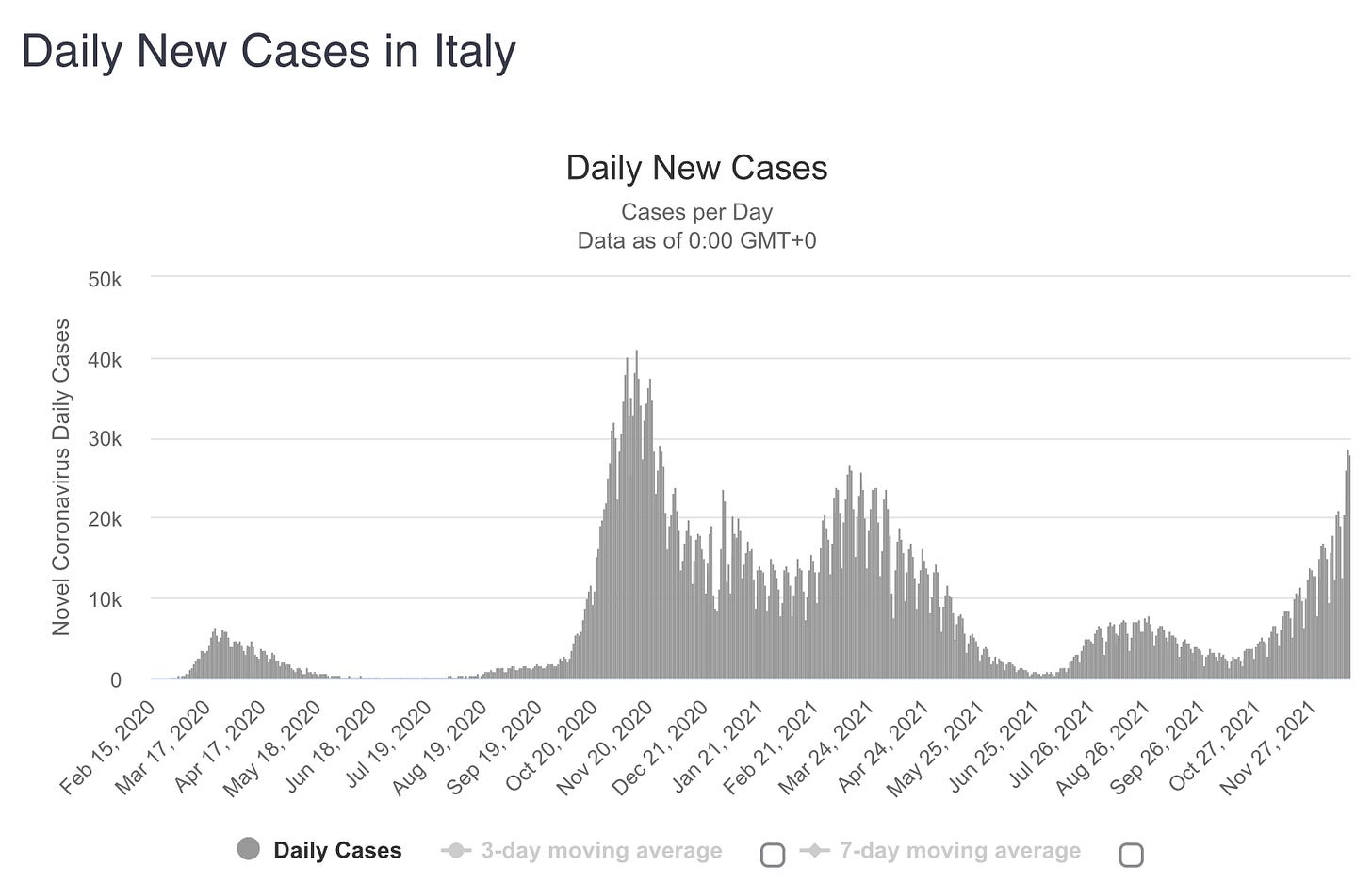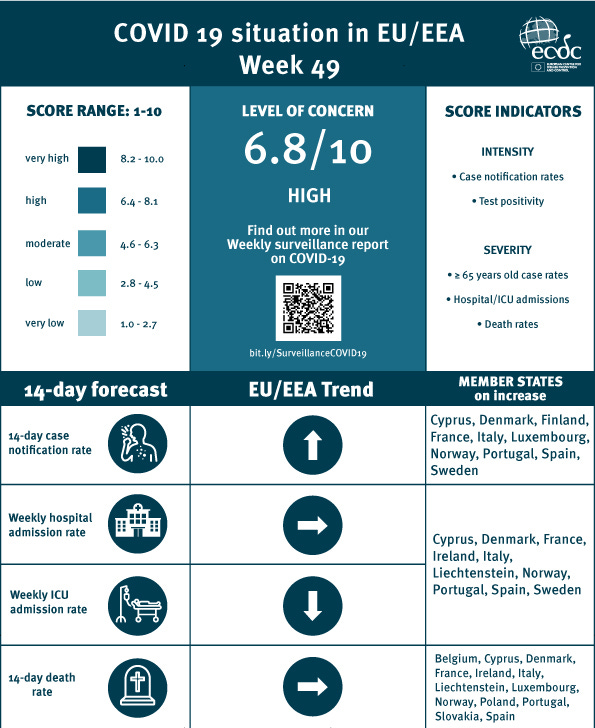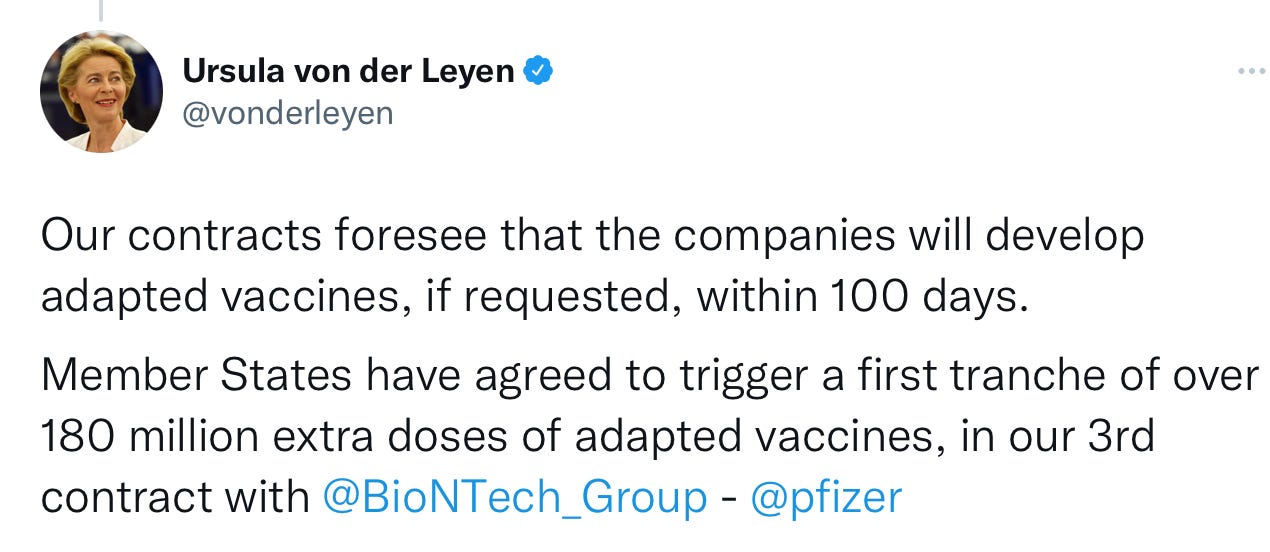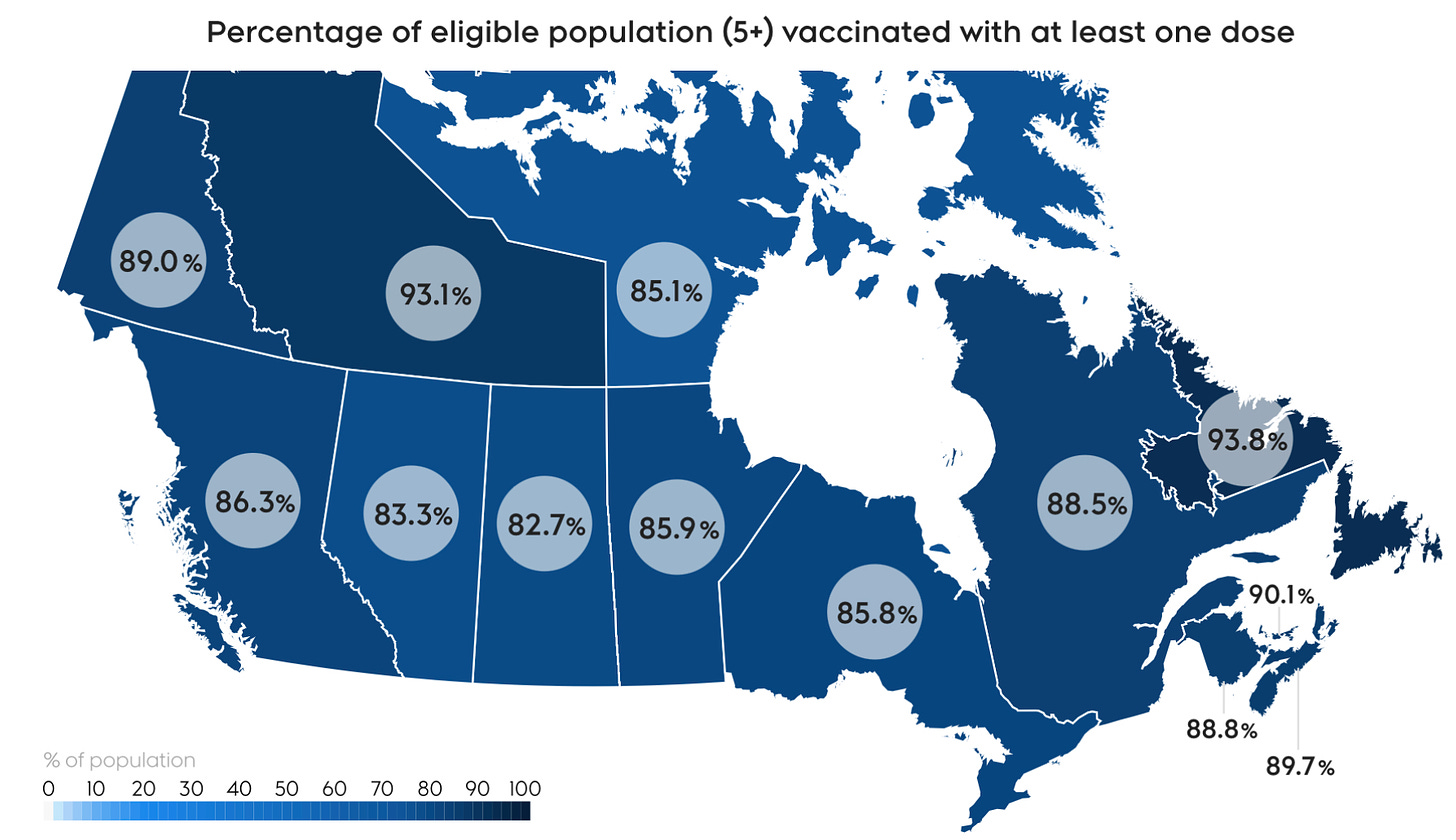Editor’s Note - Informeret will be pausing over the Christmas holidays so I can focus on spending time with my family. If there is something major, I will push out an update to keep you informed. Barring that, we won’t go back to our regular schedule until the 1st week of January.
Thank you for reading the newsletter and to all of you who have subscribed. I wish you all a very safe and Merry Christmas and all the best in the New Year.
See you then,
Shane
🇩🇰
Over the weekend, the Staten Serum Institut released new Omicron variant forecasts for the weeks ahead. While the results from crunching the numbers are pretty grim, the report’s authors also advise caution with their results. For one thing, the modeling was done before Denmark lowered the boom and introduced a wide array of restrictions. The other caution flag is just our lack of knowledge on some key aspects of the variant itself, like does it have more or less severe impacts? To what degree is it able to evade antibodies from vaccines or a previous infection? These are all knowledge gaps the scientific community is racing to fill.
The SSI modeling estimated daily infection numbers could range from 9,000 to 45,000 cases a day fairly quickly. If Omicron poses the same admission risk as Delta, then hospitalizations could be in the 130 to 250 range each day. If Omicron had half the hospitalization risk of Delta, then daily admissions would be more in the range of 120 to 190 per day.
The agency has determined that it will be people with two doses of the vaccine 50 years old and older, who are at highest risk of getting sick and being hospitalized. Two major factors are at play here. One is that most of Denmark’s population is fully vaccinated, hence a much larger group of especially older people as opposed to those who are unvaccinated. The other factor is waning immunity from older people who have had two doses and were generally among the first few waves to be vaccinated, so thus the first waves of people to also now see waning immunity unless they have received a booster dose.
The SSI stresses population behavioral changes could have a major impact on the forecast and on the epidemic situation in general. But it estimates it will take at least a week to begin to assess any impacts from the new restrictions and peoples behavior. For hospitalizations because they are a laggard statistic, infections go up and hospital admissions follow a few weeks later, the agency says it will take at least a couple of weeks to see any impacts one way or the other there.
-
The latest update from Denmark’s Staten Serum Institut has confirmed 18,753 cases of the new Omicron variant as of Sunday afternoon. That is an additional 7,194 cases since Friday’s update.
79% of the cases so far have been among people with two vaccine doses.
There have been 115 total Omicron-related hospitalizations so far, but fewer than 35 are currently in hospital.
As of December 15, the Omicron variant made up 29% of all sequenced positive test results, a number that was just 3.5% ten days prior.
-
Denmark’s Ministry of Transportation has extended the flight ban on ten South African countries that was put in place on November 27 due to Omicron variant fears. The ban will remain in place until at least January 14. Direct flights from Angola, Botswana, Eswatini (formerly Swaziland), Lesotho, Malawi, Mozambique, Namibia, South Africa, Zambia, and Zimbabwe are banned, which is easy because there aren’t any. Any travelers from those countries must have a recognizable purpose to enter Denmark and have a pre-flight negative PCR test. Another test is required on arrival, as is a ten day quarantine.
Other countries, like the UK, where Omicron variant numbers are also exploding, have rescinded the travel bans with the rationale they aren’t protecting against much, with the variant already spreading like wildfire.
-
Denmark added 16,806 new COVID infections and another 22 coronavirus deaths on Saturday and Sunday. It reported 8,594 corona cases on Saturday and then another 8,212 on Sunday. It sounds like the usual weekend lag may have been a bit more severe over the last two days. We will know for sure if the daily infection numbers roar back either today or tomorrow.
There were 414,785 total corona tests done on Saturday, of which 191,578 were PCR tests equaling a positivity percentage of 4.28%.
The Staten Serum Institut says some system upgrades over the weekend caused delays in getting PCR tests results to people. However, the agency says everything is back up and running again and test results should be sent out in normal turnaround times from Monday (today) and on.
-
COVID hospitalizations (560) leapt upward again (+27) while the number of infected people in an ICU (63) nudged downward (-2) and of those the number on a ventilator (35) is unchanged.
-
On the vaccination front to date, 80.8% of the total population has one dose, with another 10,815 getting their first shot on Saturday. While 83,982 booster doses were administered pushing past the 33% milestone, or to look at it another way, one out of every three people in Denmark now has a booster dose.
-
The Danish National Health Board says the number of young people coming in to get vaccinated has suddenly turned around. The agency says the vaccination rate for children aged 12 to 15 years old had been going much slower than expected, but not anymore. As Denmark experiences it’s most severe infection wave yet, young people are now showing up to get vaccinated in numbers.
The health board says three out of every four 12 year olds now have a first dose, and among those who are 14 years old, eight out of every ten either has a second dose or is scheduled to get one.
Deputy Director Helene Probst:
“Vaccines are our best tool for curbing widespread infection among children. I am therefore very pleased to see that among older children and teenagers, more and more people are accepting the offer. In a little while it will be Christmas, and we are entering a time when children, parents, and grandparents meet more than ever. If the children have been vaccinated, we can prevent the infection from spreading to other family members, who may suffer serious illness. It is therefore a good time to get your child vaccinated.”
-
As of this week, pregnant women and vulnerable and high-risk people aged 18 to 39 years old can get a booster dose. The third dose can be administered four and a half months after a second after an assessment by a doctor.
Unit Head Bolette Søborg:
“The vast majority of 18-39-year-olds do not have an increased risk of becoming seriously ill with COVID. However, in light of the current epidemic, we believe that it is a good idea for some people to be able to get a 3rd dose a little quicker if a doctor deems it appropriate. It can, for example, be a pregnant woman, a person with severe obesity, or heart disease, or a person with severe chronic lung disease who, due to anxiety about being infected, isolates themselves socially with their well-being suffering. You are automatically invited to get a 3rd dose 165 days after your 2nd if you are between 18 and 39 years old. However, if you have an increased risk, you can talk to a doctor and see if it might be a good idea for you to get the booster dose about a month earlier.”
-
A swath of new COVID restrictions and closures came into force across Denmark as of Sunday (yesterday) morning. Despite the pseudo lockdown, at least one expert isn’t banking on seeing any immediate impacts to the epidemic situation.
Professor of Experimental Virology Allan Randrup Thomsen spoke to DR:
“When it comes to Omicron, I'm always a little bit pessimistic. It is far worse than what we have seen before.”
While the restrictions and closures are only supposed to remain in place until January 17, Thomsen wouldn’t bet against an extension.
“I certainly do not want to rule it out, but I hope we can get through Christmas. We have come through this before in a good way, and then it may well be that we can return to a more normal life. Time will tell.”
For an overview of the closures and restrictions, you can read our report HERE.
-
Just a reminder that a seat reservation is again required on trains. It was one of the new measures that came into force on Sunday to try and ensure social distancing between rail passengers.
If you don’t have a seat reservation or cannot show a coronapas on the rail system, then you could face a hefty fine. It isn’t just long-distance trains either, as the reservation requirement also applies to intercity and intercity light rail.
While seat reservations for DSB trains are usually free, that will not be the case over Christmas. The DSB will charge a 30 kroner to reserve a seat over the holidays to try and prevent people from boarding rail tickets.
-
The Danish Agency for Patient Safety has unveiled a digital option for people to register as close contacts, pass on important information, and schedule the requisite tests, all without having to wait on hold for hours at a time. The agency says once someone is notified they are a close contact, they need to get the date of the person’s positive test result and their requisition number. Once you have those two pieces of information, you can log onto coronaprover.dk and follow the prompts to enter information as a close contact. You can also schedule both of the required tests.
The agency is hoping this will relieve significant pressure that had been building on phone lines leading to long queues as people waited to talk to contact tracers. It says since the digital option went online on Friday, over 20,000 people have used it to register as close contacts and to schedule their tests.
🇩🇪 🇩🇰
Germany now classifies Denmark as a COVID high-risk area. Entry restrictions were officially tightened as of Sunday night. The new rules mostly target those who are unvaccinated. Anyone who is not vaccinated coming from Denmark will have to show a negative COVID test to German authorities. Even then they must go into a ten day quarantine. If they are unvaccinated and do not have a negative corona test, then they are not allowed to enter Germany at all. Border commuters and those who are making day trips or transiting through Germany with a total stay of less than 24 hours are exempt from the quarantine requirement.
🇸🇪
Sweden won’t table its first COVID update until Tuesday.
-
While Denmark and Norway bring down the hammer with a wide array of restrictions and closures, that is not the course that Sweden will chart. Minister of Social Affairs Lena Hallengren told Swedish Radio over the weekend that those kinds of drastic measures will not be happening in Sweden. The minister is due to announce restrictions aimed at the Christmas season by early this week.
“I cannot give you any details, but I cannot see the type of measures in Sweden to the extent that has been done in Denmark and Norway. We will provide more information at the beginning of the week.”
While Sweden has tabled a number of restrictions in recent weeks to try and head off an expected infection surge, it does so by making recommendations that aren’t backed up with mandates or any enforcement for non-compliance.
-
The epidemic situation in Sweden’s capital region continues to deteriorate as the number of COVID admissions has doubled since December 1. There are 183 people in hospital, an increase of 41 from the previous week. So far, 52 cases of the Omicron variant have been confirmed.
Chief Physician Johan Bratt:
“Both the spread of infection and the number of patients in our hospitals with COVID unfortunately continued to increase over the last week. The number of infections has increased by almost 40% and today twice as many patients have been admitted to our hospitals than at the beginning of the month.”
Bratt says it is not just coronavirus that is adding pressure to the hospital system.
“Unfortunately, the increase comes at the same time as the seasonal flu has picked up. This puts healthcare in a difficult position.”
Bratt is appealing for patience. He advises people to check in with the 1177 health-line before showing up at the hospital. For those with symptoms that might be COVID, he urges them to get tested first.
Almost 60,000 booster doses were administered in Region Stockholm last week.
-
A population-level study of seniors in the Gothenburg area has found the vast majority of those born in 1944 have COVID antibodies. The study done by Region Västra Götaland, the Swedish Public Health Agency, and University of Gothenburg, is a follow up from an initial examination begun in March. Of the 553 participants, 96.4% were found to have antibodies against coronavirus. Of those, 96.3% were fully vaccinated.
🇳🇴
Norway has added 14,060 COVID infections and two more virus deaths since its Thursday update.
On the Omicron variant front as of Sunday’s report, there are now 2,060 confirmed cases of the variant.
COVID hospitalizations (356) have dropped (-15) while the number of infected people in an ICU (117) edged downward (-1).
To date, 79.2% of Norwegians aged 12 years old and older have had one vaccine dose, 72.3% have two, and 22.7% have a booster dose.
🇫🇮
Finland doesn’t update its COVID numbers on the weekend and it will table three days worth of data later today.
-
The Finnish government will meet on Tuesday to decide whether to activate its COVID emergency brake as the country battles an infection wave that has pushed daily cases to record highs. The emergency brake mechanism if activated, would allow the government to levy a wide ranging number of restrictions. Prime Minister Sanna Marin said on Sunday that extending the Christmas holiday break for schools is also on the table.
-
The Hospital District of Helsinki and Uusimaa has raised its COVID emergency preparedness to its highest level as infection numbers shoot upward. The increase is coronavirus cases is also being exacerbated by the sheer number of healthcare workers who are off-sick.
-
The Finnish Institute for Health has shortened the interval in some cases between a 2nd and 3rd vaccine dose. On Friday, the agency said seniors 60 years old and older can get a booster dose between three and four months after having a second shot. For those who are younger, the interval is four to six months after a second dose. Finland, like Denmark and Norway, is also seriously amping up its efforts to administer booster doses in order to try and increase societal protection against the rapidly spreading Omicron variant.
🇩🇪
Germany is seeing a declining infection curve after setting new daily record highs. Over the weekend, the country’s health minister, Karl Lauterbach, ruled out another national lockdown before the Christmas holidays. The minister told Reuters that a lockdown at this point would come too late as a 5th wave could no longer be stopped.
“We will not close down before Christmas. But a fifth wave is inevitable. We have passed a critical number of cases. This wave can no longer be stopped completely.”
Lauterbach also told another media outlet that a post holiday season lockdown is also highly unlikely.
On Sunday, Germany reported 30,950 new infections and another 439 corona deaths.
🇫🇷
France has canceled the usual big fireworks display on the famed Champs-Élysées boulevard because of fears the Omicron variant could become an uninvited guest to the party. French health experts had warned the big New Years bash could easily become a super spreader event even as France tries to curtail the variant’s rapid spread.
Over the weekend, France also officially slammed the door to travel to and from the United Kingdom. Travelers from the UK will need an “essential reason” to enter France, all tourist and non-essential travel is banned, travelers will also need a negative COVID test no more than 24 hours old, and a seven day quarantine is also required.
While France didn’t report on Sunday, it is seeing a new infection wave pushing numbers close to record highs even as the Omicron variant spreads.
-
France is following Germany and Switzerland’s example and is increasing pressure on those who are unvaccinated. Beginning next month, the French government will introduce a new rule that bars unvaccinated people from doing things like going into restaurants or taking long-distance public transport, like trains.
French Prime Minister Jean Castex said at a news conference that enough is enough.
“We can not allow the rejection of vaccines by a few French people to affect the lives of the whole country.”
Currently, a recent negative COVID provides access to events, restaurants, and other activities even if a person is unvaccinated. France has also reduced the interval between a 2nd and 3rd dose from five down to four months.
🇳🇱
As of Sunday morning, the Netherlands has gone back into a national lockdown with schools, non-essential shops, bars, restaurants, and an array of public places are all closed. A number of events are banned including Christmas markets. Groups of more than two people outside are banned unless they all live at the same address. The gathering outside cap increases to four over Christmas. This is due to fears of another massive infection wave fueled by the new Omicron variant. The lockdown will remain in place until at least January 14.
On Sunday, the Netherlands reported 13,259 new COVID cases and 48 more corona deaths.
🇮🇹
Italy is seeing the highest infection numbers since November of 2020 as its infection curve bends back upward. COVID numbers have increased by more than 90% in just the last three weeks. On Sunday Italy registered 24,259 more corona cases and another 97 deaths
Last week, Italy tightened entry restrictions mandating COVID tests for all travelers and a mandatory five-day quarantine for anyone arriving in Italy who is unvaccinated.
🇮🇪
Omicron rising. The new variant is now the dominant strain in Ireland, according to the country’s health officials. So far over 5,000 cases of the variant have been confirmed and it is estimated to make up 52% of all positive test results.
Ireland’s Chief Medical Health Officer Tony Holohan told Irish RTE News that the variant moved at stunning speed.
“It has taken less than two weeks for Omicron to become the dominant strain in Ireland, and it shows how contagious this variant is.”
🇪🇺
The European Centre for Disease Prevention and Control rates the COVID situation across the EU as of December 12 as 6.8 or a ‘high concern.’ This is down from the previous weeks 8.3 or ‘very high concern’ ranking. Despite the slight easing in its rating assessment, the ECDC says the pandemic situation remains serious, especially in the western and northern parts of the European Union. Infection numbers are still rising, but the fatality rate has been stable for three weeks now.
The COVID incidence rate per 100,000 people in Europe actually declined in the latest weekly assessment going from 809.1 to 783.7 from one week to the next.
As for hospitalizations, the ECDC says of 29 countries reporting data on hospital and intensive care admissions, 12 registered increasing numbers in at least one of the indicators.
The Delta variant remained king in Europe in the week ending on December 12, responsible for 97.3% of all sequenced positive test results. The health agency says the Delta variant is spreading so fast it has “limited the reduction in transmission achieved by the COVID vaccination roll-out.” But it also notes the new Omicron variant, which we know is three or four times more infectious than Delta, is also spreading rapidly across Europe accounting for 0.4% of all infections, a number that will certainly grow.
By the end of week 49, the cumulative vaccination uptake for one vaccine dose across Europe was 71.6% and for two doses it was 67.2%. Numbers will, of course, vary widely from country to country.
The ECDC has just two countries assessed as having a COVID situation of ‘very high concern’ and they are France and Liechtenstein. That is down from eight countries ranked as a very high concern in the previous week’s report. 21 countries are assessed as a ‘high concern’ including Denmark, Finland, Norway, Sweden, Germany, and Spain. Six countries are a ‘moderate concern’ including Austria, Iceland, and Italy. Romania is the only EU nation in the ‘low concern’ category.
🇪🇺🦠💉
The Irish Times is reporting that the European Union is coordinating with vaccine makers on an “Omicron-specific” vaccine and to secure doses for any such reformulated vaccine. The paper cites the Prime Minister of Ireland as saying the EU Commission is working with pharmaceutical companies on a variant specific vaccine. Micheál Martin said that mRNA vaccine makers can tweak the formula of their COVID vaccines to “respond to particular variants.”
The President of the EU Commission confirmed the European Union’s contract with vaccine makers does include provisions that vaccine makers adapt or tweak vaccine formulas if needed.
🇨🇦
Canada doesn’t update its COVID dashboard on the weekends. However, on Friday the national infection curve was climbing virtually straight up, and if numbers from Ontario and Quebec over the weekend are any indicator, the situation could be getting worse as a fifth wave arrives.
-
Rising concerns about the Omicron variant matched by rapidly rising infection numbers have prompted the National Hockey League to cancel all cross border games between Canadian and American teams through to December 23. That is when the league shuts down for its Christmas break.
-
On the vaccination front so far, 31,236,944 1st vaccine doses (81.69% of the total population) have been administered so far, with 29,279,331 people (76.57%) now fully vaccinated. Of those, 4,304,416 booster doses have been administered.
Of the Canadian provinces reporting on the weekend:
In Ontario over the weekend there were 7,478 new COVID cases. The province reported 3,301 infections on Saturday and then another 4,177 on Sunday. Of those, 1,869 were people who either had one vaccine dose or none at all. There are 283 people in hospital and 159 in intensive care. Ontario reimposed limits on gatherings as of Sunday, capping them at 10 people indoors and 25 outdoors.
Quebec reported 7,477 new infections over the weekend, including a record high 3,846 cases on Sunday. It also suffered another five fatalities.
In Atlantic Canada, Nova Scotia posted back-to-back record-breaking days with 426 new infections on Saturday and then another 476 on Sunday. New Brunswick had 133 new infections s and two deaths on Sunday and another 108 corona cases on Saturday. The province has confirmed 30 cases of the Omicron variant so far.




